-
 Bitcoin
Bitcoin $82,315.2997
0.26% -
 Ethereum
Ethereum $1,823.2360
1.36% -
 Tether USDt
Tether USDt $0.9998
-0.02% -
 XRP
XRP $2.0874
-1.98% -
 BNB
BNB $604.9336
0.82% -
 Solana
Solana $125.1265
0.41% -
 USDC
USDC $1.0001
0.00% -
 Dogecoin
Dogecoin $0.1658
-0.16% -
 Cardano
Cardano $0.6607
0.31% -
 TRON
TRON $0.2390
3.42% -
 Toncoin
Toncoin $4.0964
5.15% -
 Chainlink
Chainlink $13.5180
1.22% -
 UNUS SED LEO
UNUS SED LEO $9.1429
0.28% -
 Stellar
Stellar $0.2635
-0.99% -
 Avalanche
Avalanche $18.7513
-0.54% -
 Shiba Inu
Shiba Inu $0.0...01235
-0.43% -
 Sui
Sui $2.2705
-2.49% -
 Hedera
Hedera $0.1633
-2.48% -
 Polkadot
Polkadot $4.0235
0.12% -
 Litecoin
Litecoin $83.2209
-2.86% -
 MANTRA
MANTRA $6.2207
-0.05% -
 Bitcoin Cash
Bitcoin Cash $302.7871
1.51% -
 Bitget Token
Bitget Token $4.4968
-1.84% -
 Dai
Dai $0.9998
-0.02% -
 Ethena USDe
Ethena USDe $0.9998
-0.03% -
 Pi
Pi $0.7186
-6.72% -
 Hyperliquid
Hyperliquid $12.9760
4.32% -
 Monero
Monero $215.0706
-1.27% -
 Uniswap
Uniswap $5.9711
1.92% -
 Aptos
Aptos $5.2652
-0.07%
Who is the custodial bank for Bitcoin ETFs?
Bitcoin ETF custodians require specialized expertise in blockchain security and regulatory compliance, unlike traditional banks; the choice depends on the issuer's risk tolerance and the custodian's security infrastructure and insurance.
Feb 27, 2025 at 05:12 am
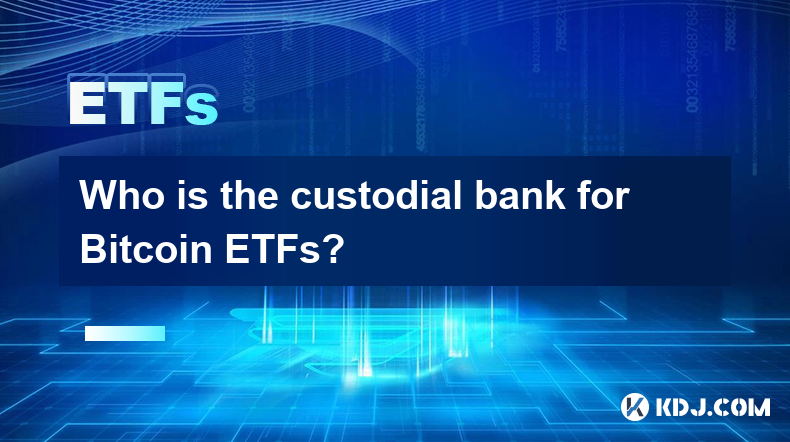
Who is the Custodial Bank for Bitcoin ETFs? A Deep Dive into Custody Solutions for Crypto Exchange-Traded Funds
Key Points:
- The role of a custodial bank in a Bitcoin ETF is crucial for ensuring the security and integrity of the underlying Bitcoin assets. They act as a trusted intermediary, safeguarding the Bitcoin held on behalf of ETF investors.
- Several factors influence the choice of a custodial bank, including regulatory compliance, security infrastructure, insurance coverage, and reputation.
- No single bank universally acts as the custodial bank for all Bitcoin ETFs. The choice depends on the specific ETF issuer and its risk tolerance.
- The complexity of managing Bitcoin custody necessitates specialized expertise and infrastructure, which has led to the emergence of specialized custodians and partnerships between traditional banks and crypto-focused firms.
- Concerns regarding the security and insurance of Bitcoin held in custody are significant considerations for both ETF issuers and investors.
Exploring the Custodial Landscape for Bitcoin ETFs:
The question of "Who is the custodial bank for Bitcoin ETFs?" doesn't have a simple answer. Unlike traditional ETFs that often rely on established banking institutions for custody of underlying assets like stocks or bonds, Bitcoin ETFs require a more nuanced approach due to the unique characteristics of Bitcoin. The choice of custodian is a critical decision for an ETF issuer, impacting investor confidence and the overall viability of the product. Let's delve into the complexities involved:
- Understanding the Role of a Custodial Bank in a Bitcoin ETF: A custodial bank for a Bitcoin ETF acts as a highly secure vault for the Bitcoin assets backing the ETF shares. They are responsible for the safekeeping, management, and accounting of these assets. This includes preventing theft, loss, or unauthorized access. The custodian's responsibility extends beyond simple storage; they must also manage the complexities of Bitcoin's cryptographic nature, including secure key management and transaction processing. This requires expertise in blockchain technology, digital asset security, and regulatory compliance. The custodian's actions directly impact the integrity of the ETF, ensuring that the value of the ETF shares accurately reflects the value of the underlying Bitcoin. The selection of a custodian is therefore a crucial step in establishing trust and transparency in the market. Investors need confidence that their investment is secure and properly managed. A reputable custodian with a proven track record in security and regulatory compliance is essential for attracting investors.
Factors Influencing the Selection of a Custodial Bank: Several key factors determine which bank or institution will act as custodian for a given Bitcoin ETF. These factors are interconnected and must be carefully weighed by the ETF issuer.
- Regulatory Compliance: The legal and regulatory landscape surrounding cryptocurrencies varies significantly across jurisdictions. A custodial bank must comply with all applicable laws and regulations related to the custody and management of digital assets. This includes anti-money laundering (AML) and know-your-customer (KYC) regulations, as well as any specific rules governing the operation of Bitcoin ETFs in the relevant market. Navigating these complex regulations requires significant expertise and resources, making the choice of a compliant custodian paramount.
- Security Infrastructure: The security of the Bitcoin assets is paramount. The chosen custodian must have robust security measures in place to protect against theft, hacking, and other security breaches. This includes utilizing cutting-edge technology, employing skilled security personnel, and implementing multi-layered security protocols. Physical security, cybersecurity, and insurance coverage are all critical aspects to consider. The custodian should have a demonstrable track record of successfully protecting digital assets, ideally with experience in handling significant volumes of Bitcoin.
- Insurance Coverage: While no system is completely foolproof, insurance provides an additional layer of protection against losses due to unforeseen events like theft or hacking. A custodian with comprehensive insurance coverage can mitigate the risk for the ETF issuer and investors. The amount and type of insurance coverage should be carefully reviewed, ensuring it adequately covers the value of the Bitcoin assets under management. This is especially crucial given the volatility of Bitcoin's price.
- Reputation and Track Record: The reputation and track record of the potential custodian are vital considerations. The issuer should choose a custodian with a long-standing history of reliability and trustworthiness. A strong reputation within the financial industry inspires confidence in the ETF and its underlying assets. The custodian's experience in handling similar assets, ideally including digital assets, is highly desirable. Thorough due diligence is crucial to verify the custodian's claims and assess its overall suitability.
- Technological Expertise: Bitcoin custody requires specialized knowledge of blockchain technology, cryptographic principles, and secure key management. The custodian must possess the technical expertise to handle the complexities of Bitcoin transactions and storage securely and efficiently. This includes understanding the nuances of different Bitcoin wallets, the risks associated with private key management, and the best practices for secure transaction processing.
- The Emergence of Specialized Custodians and Partnerships: The unique requirements of Bitcoin custody have led to the rise of specialized custodians focusing exclusively on digital assets. These firms often possess superior technology and expertise compared to traditional banks that might be less familiar with the intricacies of cryptocurrencies. In addition, we see partnerships forming between traditional banks and specialized crypto custodians. This allows traditional banks to offer Bitcoin ETF custody services without needing to build their expertise from scratch, while specialized custodians benefit from the established infrastructure and reputation of their banking partners. This collaborative approach is likely to become increasingly common as the Bitcoin ETF market matures.
- Addressing Security and Insurance Concerns: Security and insurance are ongoing concerns in the context of Bitcoin ETF custody. The inherent volatility of Bitcoin, combined with the potential for sophisticated cyberattacks, necessitates a multi-layered security approach. Custodians must continuously invest in advanced security measures to stay ahead of evolving threats. Transparency in security practices and regular audits are essential to build trust and confidence among investors. Furthermore, the availability and adequacy of insurance coverage are crucial considerations. The insurance policies should cover a wide range of potential risks, including theft, hacking, and operational failures. The coverage limits should be sufficient to protect investors' assets in the event of a significant loss.
FAQs:
Q: Are all custodial banks equally equipped to handle Bitcoin ETFs?
A: No. Custodial banks for Bitcoin ETFs need specialized expertise in blockchain technology, digital asset security, and regulatory compliance. Not all banks possess these capabilities, and the suitability of a bank will vary depending on the specific requirements of the ETF issuer and the regulatory environment.
Q: What happens if the custodial bank for a Bitcoin ETF goes bankrupt?
A: The specifics would depend on the bankruptcy process and the legal framework governing the ETF. Ideally, the Bitcoin assets held in custody would be segregated from the bank's other assets, protecting them from creditors. However, the exact outcome can be complex and uncertain, highlighting the importance of selecting a financially stable and reputable custodian.
Q: How can I verify the security measures of a Bitcoin ETF's custodian?
A: The ETF issuer should provide information on the custodian's security practices, possibly through audits or other transparency initiatives. Look for evidence of robust security measures, including multi-signature wallets, cold storage solutions, and insurance coverage. Independent research into the custodian's reputation and track record is also advisable.
Q: Are there any regulatory bodies overseeing Bitcoin ETF custodians?
A: Yes, depending on the jurisdiction, various regulatory bodies oversee custodial banks and their activities related to digital assets. These regulatory bodies often have specific requirements for the security, compliance, and operational procedures of custodians. The specific regulations will vary by country or region.
Q: What are the risks associated with Bitcoin ETF custody?
A: Risks include hacking, theft, operational failures, regulatory changes, and bankruptcy of the custodian. These risks are mitigated through robust security measures, insurance coverage, regulatory compliance, and the selection of a financially stable and reputable custodian. However, no system is completely risk-free.
Disclaimer:info@kdj.com
The information provided is not trading advice. kdj.com does not assume any responsibility for any investments made based on the information provided in this article. Cryptocurrencies are highly volatile and it is highly recommended that you invest with caution after thorough research!
If you believe that the content used on this website infringes your copyright, please contact us immediately (info@kdj.com) and we will delete it promptly.
- Bitcoin (BTC) price dips below ascending channel pattern as whales mirror a 2020 bull run signal
- 2025-04-01 07:50:12
- Mutuum Finance (MUTM) Has Been Relatively Quiet, But It's Building Fast
- 2025-04-01 07:50:12
- Cardano (ADA) Gains 4% This Week, Trading at $0.74 as Bullish Pressure Builds
- 2025-04-01 07:45:12
- Elon Musk Quashes Rumors of U.S. Government Using Dogecoin (DOGE) in Any Kind of Operations
- 2025-04-01 07:45:12
- Ethereum (ETH) and Solana (SOL) Prices Could Plunge as FTX Begins Creditor Repayments on May 30
- 2025-04-01 07:40:12
- Acting SEC Chair Rejects Enforcement, First US Bank-Issued Stablecoin, Bitcoin's Four-Year Cycle at Crossroads
- 2025-04-01 07:40:12
Related knowledge
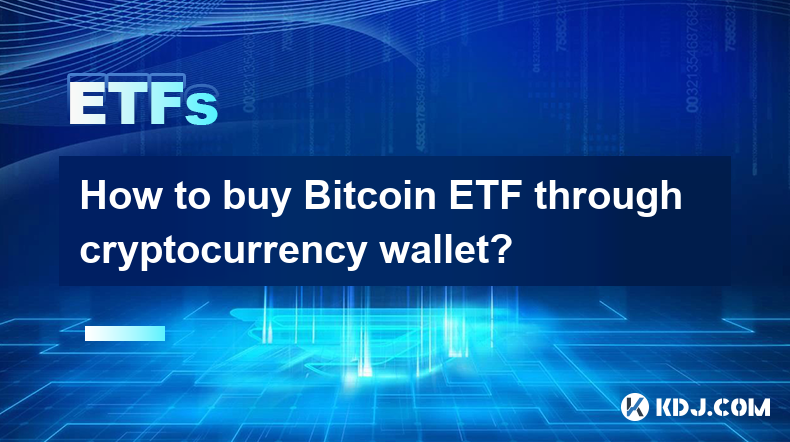
How to buy Bitcoin ETF through cryptocurrency wallet?
Mar 30,2025 at 08:22pm
It's important to understand that you cannot directly buy a Bitcoin ETF through a cryptocurrency wallet. Cryptocurrency wallets are designed to hold and manage digital assets like Bitcoin itself, not exchange-traded funds (ETFs). Bitcoin ETFs are traded on traditional stock exchanges, not decentralized cryptocurrency exchanges. Therefore, the process i...
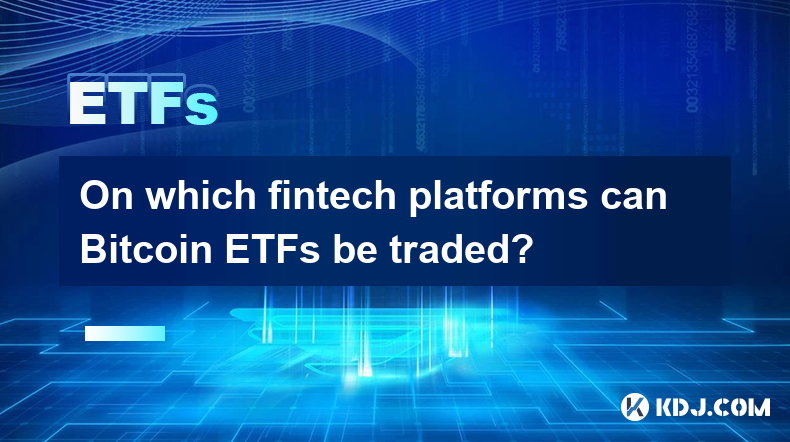
On which fintech platforms can Bitcoin ETFs be traded?
Mar 28,2025 at 09:21am
Navigating the Bitcoin ETF Landscape on Fintech PlatformsThe availability of Bitcoin ETFs on fintech platforms is a rapidly evolving landscape. Currently, the approval and subsequent listing of Bitcoin ETFs are subject to regulatory hurdles and vary significantly by jurisdiction. Therefore, the specific platforms offering Bitcoin ETF trading depend hea...
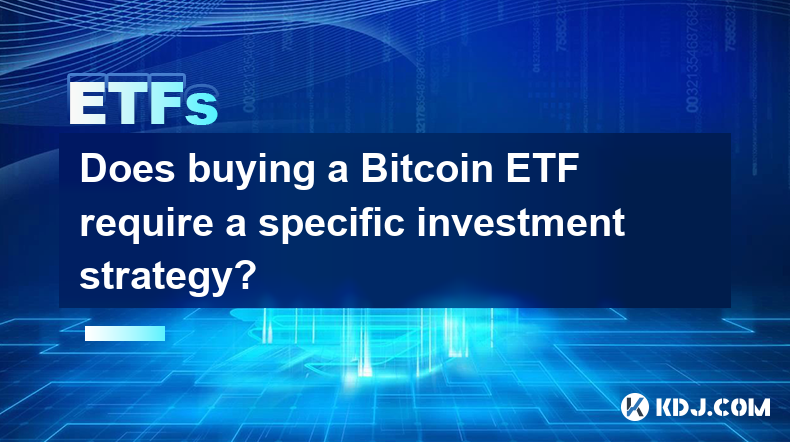
Does buying a Bitcoin ETF require a specific investment strategy?
Mar 27,2025 at 06:36pm
Understanding Bitcoin ETFs and Investment StrategiesA Bitcoin Exchange-Traded Fund (ETF) is a type of investment fund that tracks the price of Bitcoin. Investing in a Bitcoin ETF offers exposure to the cryptocurrency market without the complexities of directly owning and securing Bitcoin. However, like any investment, a successful strategy requires car...
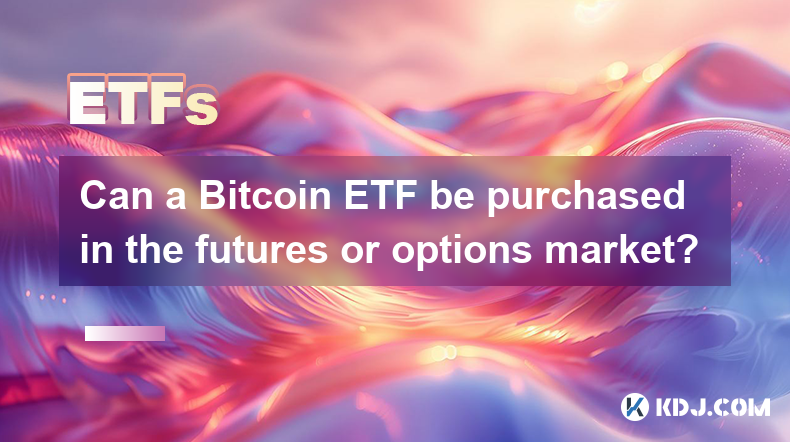
Can a Bitcoin ETF be purchased in the futures or options market?
Mar 27,2025 at 02:49am
Understanding Bitcoin ETFs and Derivative MarketsA Bitcoin ETF (Exchange-Traded Fund) is a fund that tracks the price of Bitcoin. Unlike directly buying Bitcoin, an ETF offers a more regulated and accessible way for investors to gain exposure to the cryptocurrency market through traditional brokerage accounts. However, the availability of a Bitcoin ETF...

How to buy Bitcoin ETF through social trading platform?
Mar 27,2025 at 10:43am
How to Buy Bitcoin ETF Through Social Trading Platforms? Understanding Bitcoin ETFs and Social TradingA Bitcoin ETF (Exchange-Traded Fund) is a fund that tracks the price of Bitcoin. Unlike directly buying Bitcoin, an ETF offers a regulated and potentially less volatile way to gain exposure to the cryptocurrency market. This is because ETFs are traded o...
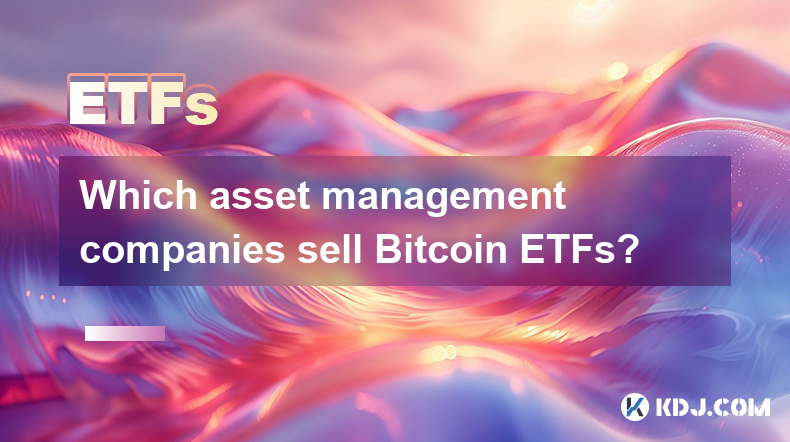
Which asset management companies sell Bitcoin ETFs?
Mar 28,2025 at 02:21am
The Current Landscape of Bitcoin ETF OfferingsCurrently, no asset management company offers a fully-fledged, SEC-approved Bitcoin ETF in the United States. While several companies have filed applications, the Securities and Exchange Commission (SEC) has yet to approve any. This is primarily due to concerns surrounding market manipulation, investor prot...

How to buy Bitcoin ETF through cryptocurrency wallet?
Mar 30,2025 at 08:22pm
It's important to understand that you cannot directly buy a Bitcoin ETF through a cryptocurrency wallet. Cryptocurrency wallets are designed to hold and manage digital assets like Bitcoin itself, not exchange-traded funds (ETFs). Bitcoin ETFs are traded on traditional stock exchanges, not decentralized cryptocurrency exchanges. Therefore, the process i...

On which fintech platforms can Bitcoin ETFs be traded?
Mar 28,2025 at 09:21am
Navigating the Bitcoin ETF Landscape on Fintech PlatformsThe availability of Bitcoin ETFs on fintech platforms is a rapidly evolving landscape. Currently, the approval and subsequent listing of Bitcoin ETFs are subject to regulatory hurdles and vary significantly by jurisdiction. Therefore, the specific platforms offering Bitcoin ETF trading depend hea...

Does buying a Bitcoin ETF require a specific investment strategy?
Mar 27,2025 at 06:36pm
Understanding Bitcoin ETFs and Investment StrategiesA Bitcoin Exchange-Traded Fund (ETF) is a type of investment fund that tracks the price of Bitcoin. Investing in a Bitcoin ETF offers exposure to the cryptocurrency market without the complexities of directly owning and securing Bitcoin. However, like any investment, a successful strategy requires car...

Can a Bitcoin ETF be purchased in the futures or options market?
Mar 27,2025 at 02:49am
Understanding Bitcoin ETFs and Derivative MarketsA Bitcoin ETF (Exchange-Traded Fund) is a fund that tracks the price of Bitcoin. Unlike directly buying Bitcoin, an ETF offers a more regulated and accessible way for investors to gain exposure to the cryptocurrency market through traditional brokerage accounts. However, the availability of a Bitcoin ETF...

How to buy Bitcoin ETF through social trading platform?
Mar 27,2025 at 10:43am
How to Buy Bitcoin ETF Through Social Trading Platforms? Understanding Bitcoin ETFs and Social TradingA Bitcoin ETF (Exchange-Traded Fund) is a fund that tracks the price of Bitcoin. Unlike directly buying Bitcoin, an ETF offers a regulated and potentially less volatile way to gain exposure to the cryptocurrency market. This is because ETFs are traded o...

Which asset management companies sell Bitcoin ETFs?
Mar 28,2025 at 02:21am
The Current Landscape of Bitcoin ETF OfferingsCurrently, no asset management company offers a fully-fledged, SEC-approved Bitcoin ETF in the United States. While several companies have filed applications, the Securities and Exchange Commission (SEC) has yet to approve any. This is primarily due to concerns surrounding market manipulation, investor prot...
See all articles























































































